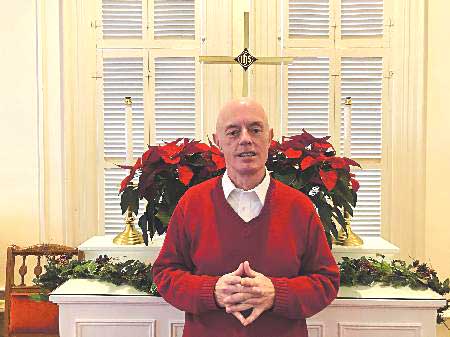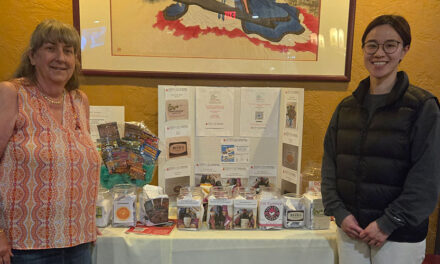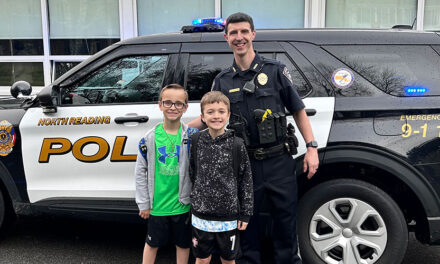Published December 24, 2020
North Reading Transcript
By MAUREEN DOHERTY

NORTH READING — What would it take to convince you to participate in a vaccine trial to combat the virus that causes COVID-19?
The turning point for Rev. Dr. Richard A. Hughes was the tragic loss of beloved church members.
Early last summer the pastor of the Union Congregational Church read an article in the Boston Globe about the Johnson & Johnson trial taking place in Boston.
“This was right after we had a third parishioner die from the COVID virus and I was really quite troubled and upset with all the talk about it being a hoax,” Rev. Hughes recalled.
“I have this saying I have always liked — there are those that make things happen, those who watch things happen and those who wonder what the heck happened. So I decided I can just sit here and be upset by everything that is going on or I can do something.”
As Rev. Hughes read about this trial, he said, “I just knew it was something I had to do. From my perspective it was the spirit at work.” So he went online and provided his information. “Then I didn’t hear from them all throughout the summer so by the early fall I thought I was not a suitable candidate,” he said.
That belief changed with a phone call in October from Brigham and Women’s Hospital in Boston, which is running the trial for Johnson & Johnson, inquiring if he was still interested. “I said ‘absolutely!’”
“What I since learned is I am in the third group. This speaks to how cautious they are to make sure it is safe. The first group to receive this particular vaccine were people 19 to 59 with no underlying health issues. The second group was 19 to 59 with some underlying health issue. The third group, which I’m in, is over 60 with no underlying health issue,” Rev. Hughes said.
He also learned that the Johnson & Johnson vaccine is different from others being discussed in the news – such as the Pfizer-BioNTech COVID-19 Vaccine, which received its Emergency Use Authorization (EUA) from the FDA Dec. 11 – “because it only requires one shot and it doesn’t have to be stored at minus 70 degrees Celsius,” he explained.
Researchers studying a second vaccine, Moderna’s COVID-19, recently revised previous estimates on its stability, stating they now believe it will remain stable in a standard refrigerator for up to 30 days as opposed to the seven days initially thought. Long term storage for up to six months would require a standard freezer temperature of minus 4F.
“I went in November 9 and they did a three-hour screening and a 30-page consent form that they went through and made sure I understood it all. My basic question, because I interact with so many people, was I wanted to make sure that participating didn’t increase the possibility that I might get the virus and pass it on to someone else. They assured me that wasn’t the case,” he said, adding, “The hardest thing for me was just getting the shot because I am a big baby when it comes to needles.”
This is a double-blind study which means neither Hughes nor those administering the study or the vaccine know whether or not he was given a placebo or the actual vaccine.
“I’m pretty sure I got the actual vaccine. I got the shot Monday evening about 5:30. I had to wait a half an hour while they monitored me. Then I went home. Tuesday I was fine. Wednesday was Veterans’ Day so I was off and I always do cardio in the morning. After I did my cardio I felt a little light-headed and I didn’t think anything of it. Then I got some chills and even though I had slept well the night before I just felt tired,” he said. Even though it was unseasonably warm that day he cranked the heat and slept for three hours.
“After I slept I went about my day and that evening I was pretty much back to normal. So my word to everyone in my case the side effects were minimal,” Hughes said. “I understand everybody has got to make their own decision based upon their unique circumstance. I would say from my perspective, the benefits far outweigh the side effects.”
Johnson & Johnson will follow him for two years. He returned for blood work a month after his shot and will go back in January for another followup after which the visits will become less frequent. The study also includes an app on his phone to maintain a simple online journal. Every couple of days he checks in and answers a simple question: “Have you experienced any COVID-like symptoms?” To date his answer has been “no.”
Hughes also learned that when his portion of the study ends it will be revealed whether he received the placebo or the real thing. If it was the placebo and the vaccine has proven to be effective those study participants would be given an opportunity to go to the front of the line when it becomes available.
After he shared his participation in the trial with his parishioners he was overwhelmed by their support but was taken aback when they called him brave and heroic. “I told them I don’t feel like a hero or brave by any stretch of the imagination,” he said. To Hughes, the true heroes are people like Sgt. Tom Encarnacao, the off-duty North Reading police officer who entered a house that was on fire just after 1 a.m. a few weeks ago to help rescue the residents.
“But if my experience can put even a few people more at ease so we can get the vaccine and get rid of this awful thing then I’m all for it. I have been a pastor for 38 years and I have been in North Reading now for 28 years and I have never experienced anything like this,” Hughes said.
“We’re at the point now that we have decided we are not going to have in-person Christmas Eve services. The infection rate is going up and on Christmas Eve, we’ve had three services in the past with up to 500 people. It’s the danger of someone coming and being infected and passing it on. That’s a Christmas gift we would rather avoid.”
“I remember the first sermon I gave when the COVID virus really hit. I said this has the potential to bring out the best in us and the worst in us. Sadly and joyfully we’ve seen both over these last several months,” Hughes said. “I always tell people it is important to remember, as people of faith, there is no ‘I’ in Jesus but there is an ‘us.’”




